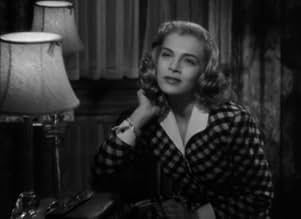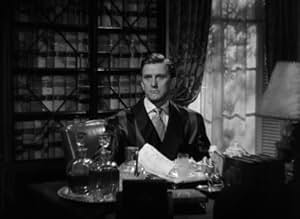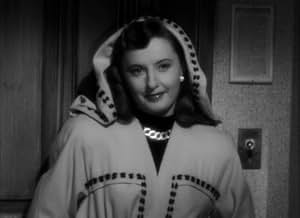VALUTAZIONE IMDb
7,4/10
11.777
LA TUA VALUTAZIONE
Un uomo si riunisce con l'amica d'infanzia e suo marito, che credono di conoscere la verità sulla morte della ricca zia anni prima.Un uomo si riunisce con l'amica d'infanzia e suo marito, che credono di conoscere la verità sulla morte della ricca zia anni prima.Un uomo si riunisce con l'amica d'infanzia e suo marito, che credono di conoscere la verità sulla morte della ricca zia anni prima.
- Regia
- Sceneggiatura
- Star
- Candidato a 1 Oscar
- 2 vittorie e 2 candidature totali
Gene Ashley
- Man
- (non citato nei titoli originali)
Walter Baldwin
- Dempsey
- (non citato nei titoli originali)
Gino Corrado
- Nightclub Waiter
- (non citato nei titoli originali)
Catherine Craig
- French Maid
- (non citato nei titoli originali)
Recensioni in evidenza
10jescue
this movie is one of those lost gems. barbara stanwyck and kirk douglas do a great job but they are not the reason this is a great gem. van heflin (of shane) and lizabeth scott are superb and in some ways overshadow kirk douglas in his screen debut and stanwyck. lizabeth smolders and pouts her way to perfection, what a babe!!. lizabeth should have been a huge star especially in the film noir genre. both van heflin and lizabeth scott are massively underrated and typically not remembered. that is a shame since they both were fine actors, that is the present generations loss. the plot is superb and throws some nice curves that keeps you on your toes.
A very good feature that seems to be a soap-opera with touches of film-noir. Barbara Stanwyck plays the femme fatale not as cold-blooded as her earlier turn in "Double Indemnity" ,but her "Martha Ivers" is one really selfish lady. And Stanwyck is as usual very good. For me the best performance comes from the always reliable Van Heflin who magnificently manages to almost carry the whole film. Kirk Douglas, in his debut, is very good as the weakling husband of Stanwyck. Lizabeth Scott who plays the most sympathetic character in the movie is very able and memorable.The movie is at almost two hours perhaps a tad long,but it is well worth investing those two hours.
Knowing absolutely NOTHING about this movie (apart from it being the screen debut of Kirk Douglas) I thought it was going to be a potboiler, but I was pleasantly surprised at how good it was. It veers between Noir and melodrama, and I gotta say I was hooked from the get go. I'm not the biggest Barbara Stanwyck fan in the world, but she was well cast as the ruthless matriarch of a small town, and Douglas really pulled off an unusual role for him (basically a drunken wimp). Van Heflin ('Shane') plays the "hero" and holds his own against those two, and I also really liked Lizabeth Scott, an actress I'm not familiar with, who plays Heflin's love interest (sorta). 'The Strange Love Of Martha Ivers' will please fans of 1940s Noir. It deserves to be better known than it is.
A powerhouse cast is assembled for "The Strange Love of Martha Ivers." It's a treat to watch this able quintet at work, making for an engrossing film experience.
Barbara Stanwyck is at her peak--sure, confident, and unfailing. Van Heflin's natural talent makes everything he does seem effortless. Kirk Douglas offers a most impressive film debut in what, in retrospect, is an uncharacteristic role. Lizabeth Scott (who seems to me a fascinating cross between Lauren Bacall and Rosemary Clooney) is constantly engaging. Long after her part has faded, Scott's image remains indelibly fixed in the memory. And finally, the great Judith Anderson is on in a strong character role.
Miklos Rozsa's compositional style is remarkable in its adaptablity. Close one's eyes, and the film could well be set a thousand years earlier--or any point in between. Which is to say, it's general, while at the same time, specific.
The writing team headed by Robert Rossen created a slick and saucy script, which holds interest throughout, and Hal B. Wallis was sharp enough to retain this productional team formula for many years. Were the film to have been given a perhaps more poetic--less Gothic--title, it might have enjoyed even greater stature in the annals of the genre.
As it is, "Ivers" is a worthy member of the noir film family.
Barbara Stanwyck is at her peak--sure, confident, and unfailing. Van Heflin's natural talent makes everything he does seem effortless. Kirk Douglas offers a most impressive film debut in what, in retrospect, is an uncharacteristic role. Lizabeth Scott (who seems to me a fascinating cross between Lauren Bacall and Rosemary Clooney) is constantly engaging. Long after her part has faded, Scott's image remains indelibly fixed in the memory. And finally, the great Judith Anderson is on in a strong character role.
Miklos Rozsa's compositional style is remarkable in its adaptablity. Close one's eyes, and the film could well be set a thousand years earlier--or any point in between. Which is to say, it's general, while at the same time, specific.
The writing team headed by Robert Rossen created a slick and saucy script, which holds interest throughout, and Hal B. Wallis was sharp enough to retain this productional team formula for many years. Were the film to have been given a perhaps more poetic--less Gothic--title, it might have enjoyed even greater stature in the annals of the genre.
As it is, "Ivers" is a worthy member of the noir film family.
"Don't look back, baby," says a man who knows his Gideon Bible, "You know what happened to Lot's wife." But her fate is mild compared to the torments of two peopleand a third they draw into their webwho can never stop looking back to something that happened when they were children. What connects this melodrama with noir films like the perfectly named OUT OF THE PAST, THE KILLERS (in which the hero explains that he is doomed because, "I did something wrong, once"), and many others is the theme that one mistake, one "reckless moment," can seal your fate forever.
The three children are Sam Masterson, a streetwise kid from the wrong side of the tracks; Walter O'Neil, a timid, obedient boy whose father is ambitious for him; and Martha Ivers, the orphaned heiress to a steel mill, who lives miserably with her aunt (Judith Anderson, in Mrs. Danvers mode). On the fateful night, all three are in the house when Martha, driven over the edge (her aunt both insults her dead father, a mill hand, and beats her kitten!) whacks her aunt with her own cane and sends her tumbling to her death at the foot of a grand staircase. Walter's father sees his chance, and holding the threat of exposure over Martha's head, takes control of her fortune and later forces her to marry Walter. When, eighteen years later, Sam (who ran away night of the killing on a circus train) blows back into town, Martha and Walter fear he has returned to blackmail them with his knowledge; Walter also fears, rightly, that Martha and Sam still carry a torch for each other. The highly-charged triangle becomes a quadrangle with the addition of Toni Marachek, a young woman just out of jail whom Sam picks up and befriends.
THE STRANGE LOVE OF MARTHA IVERS is a conventional studio product, lacking the expressive camera-work or atmospheric settings that noir usually offers. Bombastic music deafens each emotional climax; women go to sleep with their glossy masks of makeup intact; obvious back-projection and poorly staged action sequences make the film look like a staged play. None of this really diminishes the movie, however, since its power comes from a smart script, especially from the complexity of characters and relationships. There is a strong affinity between Sam and Martha, both tough and poised and hard to read, while Toni and Walter are more vulnerable and obvious, driven by the simple motivation of love. But by the end it's clear that Martha and Walter have become twins, warped by their shared guilt (they both took part in prosecuting an innocent man who was hanged for the murder), while Sam and Toni share a fundamental decency and the capacity to look ahead to a fresh start.
Nice girl Toni is there to provide eye candy and a potential happy ending for Sam, but she gets a lot of screen time, too much in fact for her one-note character. Fans of Lizabeth Scott won't agree, but unless you find her particularly alluring, her scenes get a little tedious. Van Heflin is easy-going as Sam, the self-confident gambler who thinks he's seen it all, until he encounters Martha and Walter's toxic marriage. Heflin, though rather homely, brings a likable raffishness to the part, and his casual opportunism keeps you guessing about what he'll do next.
Kirk Douglas was never cast as such a weakling again (this was his debut film) but the mismatch works brilliantly. His intensity and powerful presence make his abject character fiercely compelling, instead of merely pathetic. A less imposing actor would come off as just a milquetoast; Douglas's manliness adds an interesting touch of perversity to his plight. His weakness is inside. Douglas captures perfectly Walter's insecurity and helpless jealousy, his cowardly use of his power (through Martha's influence, he has become District Attorney), his lame attempts to project confidence, his dependence on alcohol to salve his humiliation. He's not dumb; he knows that Martha would never have married him without the threat of exposure, but he clings to his feeble hold on her because he loves her desperately. You can't help feeling sorry for him, especially when Martha accuses him and his father of coming after her money like leeches, and he cries out, "All I wanted was you!"
Then there's Martha, the mysterious center of the film. Barbara Stanwyck has an amazing ability to draw the audience to her side and at the same time make one's blood run cold. She's in her prime here as a glamorous businesswoman (with steely satisfaction she shows off the improvements she made to the factory, "all by myself") who conveys total control, yet feels trapped in a life she loathes. Her hardness is at once glorious and chilling; she controls her husband like a cruel hypnotist. When she breaks down in tears and tells Sam that she has been the victim all along, powerless and frightened, like Sam you're moved but not quite sure you believe her. Even at the end, the ambiguity is unresolved: how much is Martha the victim, how much the villain? Walter says it's no one's fault; it's just the way things are; it's what people will do to get the things they want. The scenes between Martha and Walter are the highlight of the film, saturated with a poisonous mixture of love and hate, tinged with sado-masochism ("Even pain at your hands " Walter sighs when she puts iodine on his cut hand). This pact with desire, fear, greed and guilt is the spectacle of ruin--the Sodom and Gomorrah--that prompts Sam to warn Toni, "Don't look back, baby; don't ever look back."
The three children are Sam Masterson, a streetwise kid from the wrong side of the tracks; Walter O'Neil, a timid, obedient boy whose father is ambitious for him; and Martha Ivers, the orphaned heiress to a steel mill, who lives miserably with her aunt (Judith Anderson, in Mrs. Danvers mode). On the fateful night, all three are in the house when Martha, driven over the edge (her aunt both insults her dead father, a mill hand, and beats her kitten!) whacks her aunt with her own cane and sends her tumbling to her death at the foot of a grand staircase. Walter's father sees his chance, and holding the threat of exposure over Martha's head, takes control of her fortune and later forces her to marry Walter. When, eighteen years later, Sam (who ran away night of the killing on a circus train) blows back into town, Martha and Walter fear he has returned to blackmail them with his knowledge; Walter also fears, rightly, that Martha and Sam still carry a torch for each other. The highly-charged triangle becomes a quadrangle with the addition of Toni Marachek, a young woman just out of jail whom Sam picks up and befriends.
THE STRANGE LOVE OF MARTHA IVERS is a conventional studio product, lacking the expressive camera-work or atmospheric settings that noir usually offers. Bombastic music deafens each emotional climax; women go to sleep with their glossy masks of makeup intact; obvious back-projection and poorly staged action sequences make the film look like a staged play. None of this really diminishes the movie, however, since its power comes from a smart script, especially from the complexity of characters and relationships. There is a strong affinity between Sam and Martha, both tough and poised and hard to read, while Toni and Walter are more vulnerable and obvious, driven by the simple motivation of love. But by the end it's clear that Martha and Walter have become twins, warped by their shared guilt (they both took part in prosecuting an innocent man who was hanged for the murder), while Sam and Toni share a fundamental decency and the capacity to look ahead to a fresh start.
Nice girl Toni is there to provide eye candy and a potential happy ending for Sam, but she gets a lot of screen time, too much in fact for her one-note character. Fans of Lizabeth Scott won't agree, but unless you find her particularly alluring, her scenes get a little tedious. Van Heflin is easy-going as Sam, the self-confident gambler who thinks he's seen it all, until he encounters Martha and Walter's toxic marriage. Heflin, though rather homely, brings a likable raffishness to the part, and his casual opportunism keeps you guessing about what he'll do next.
Kirk Douglas was never cast as such a weakling again (this was his debut film) but the mismatch works brilliantly. His intensity and powerful presence make his abject character fiercely compelling, instead of merely pathetic. A less imposing actor would come off as just a milquetoast; Douglas's manliness adds an interesting touch of perversity to his plight. His weakness is inside. Douglas captures perfectly Walter's insecurity and helpless jealousy, his cowardly use of his power (through Martha's influence, he has become District Attorney), his lame attempts to project confidence, his dependence on alcohol to salve his humiliation. He's not dumb; he knows that Martha would never have married him without the threat of exposure, but he clings to his feeble hold on her because he loves her desperately. You can't help feeling sorry for him, especially when Martha accuses him and his father of coming after her money like leeches, and he cries out, "All I wanted was you!"
Then there's Martha, the mysterious center of the film. Barbara Stanwyck has an amazing ability to draw the audience to her side and at the same time make one's blood run cold. She's in her prime here as a glamorous businesswoman (with steely satisfaction she shows off the improvements she made to the factory, "all by myself") who conveys total control, yet feels trapped in a life she loathes. Her hardness is at once glorious and chilling; she controls her husband like a cruel hypnotist. When she breaks down in tears and tells Sam that she has been the victim all along, powerless and frightened, like Sam you're moved but not quite sure you believe her. Even at the end, the ambiguity is unresolved: how much is Martha the victim, how much the villain? Walter says it's no one's fault; it's just the way things are; it's what people will do to get the things they want. The scenes between Martha and Walter are the highlight of the film, saturated with a poisonous mixture of love and hate, tinged with sado-masochism ("Even pain at your hands " Walter sighs when she puts iodine on his cut hand). This pact with desire, fear, greed and guilt is the spectacle of ruin--the Sodom and Gomorrah--that prompts Sam to warn Toni, "Don't look back, baby; don't ever look back."
Lo sapevi?
- QuizKirk Douglas earned this, his debut role, with the help of his old drama school friend Lauren Bacall who knew that producer Hal B. Wallis was looking for fresh talent, and she suggested Douglas to him. She encouraged Wallis to watch a play featuring Douglas. When he did, Wallis was so impressed by his performance that he cast Douglas in this film.
- BlooperWhen Martha drops Sam off at the hotel after their trip to the mountains, as she pulls away, you can see a black cable attached to the rear underside of her car.
- Citazioni
Sailor: [after Sam has crashed his car] What happened?
Sam Masterson: The road curved, but I didn't.
- Curiosità sui creditiOpening credits prologue: IVERSTOWN 1928.
- ConnessioniFeatured in Paramount Presents (1974)
I più visti
Accedi per valutare e creare un elenco di titoli salvati per ottenere consigli personalizzati
- How long is The Strange Love of Martha Ivers?Powered by Alexa
- What is 'The Strange Love of Martha Ivers' about?
- Is 'The Strange Love of Martha Ivers' based on a book?
- Why did Martha kill her aunt?
Dettagli
- Data di uscita
- Paese di origine
- Siti ufficiali
- Lingua
- Celebre anche come
- El extraño caso de Martha Ivers
- Luoghi delle riprese
- Los Angeles, California, Stati Uniti(Southern Pacific Railroad yard)
- Azienda produttrice
- Vedi altri crediti dell’azienda su IMDbPro
- Tempo di esecuzione1 ora 56 minuti
- Colore
- Proporzioni
- 1.37 : 1
Contribuisci a questa pagina
Suggerisci una modifica o aggiungi i contenuti mancanti

Divario superiore
By what name was Lo strano amore di Marta Ivers (1946) officially released in India in English?
Rispondi


































